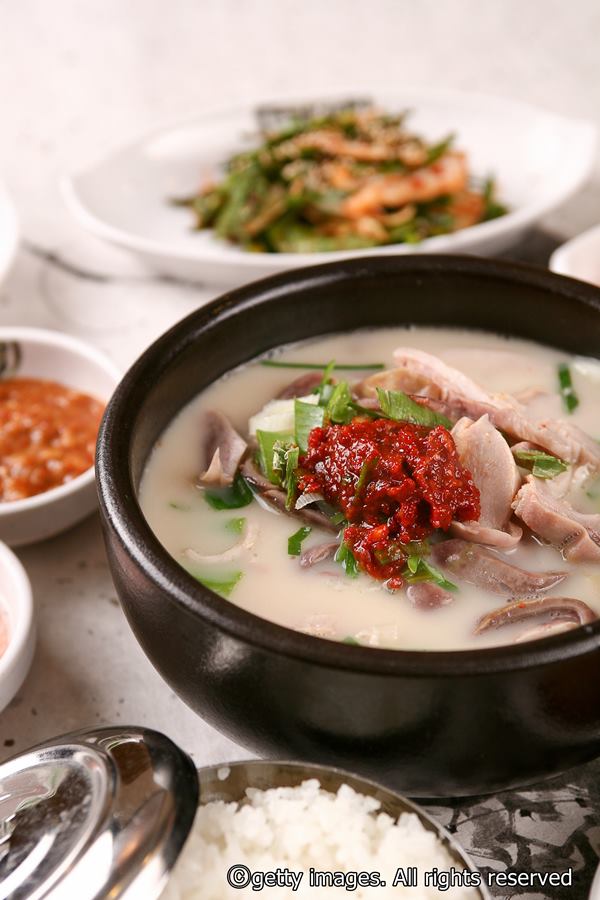Daily Busan
Michelin Guide Busan: Dwaeji gukbap

traditional: 전통적인
No Busan food guide can be trusted if it doesn’t include an ode to “dwaeji gukbap,” generous bowls of pork soup and rice that power the city’s denizens. Born from the privation of war, dwaeji gukbap is not merely a hearty soup; it is a culinary symbol of Korea’s modern history, of refugees fleeing violence, of survival during a war that tore the country in two.
Such lofty meaning granted to a humble meal of pork, soup and rice may seem excessive, but for many Busanites, dwaeji gukbap is a reminder that no matter how hard life gets, comfort is just a bowl away. Plus, it is really, really good.
Traditionally, dwaeji gukbap features a milky-white, thick and rich stock. However, the versions Michelin recommends are lighter and cleaner, reflecting Korea’s current food culture. Just as Busan is undergoing modernization, so too is its representative dish.
🥄 Clear soup at 'Hapcheon Gukbapjip' (합천돼지국밥)
Hapcheon Gukbapjip serves dwaeji gukbap rooted in tradition and full of time-tested flavors. However, its soup has evolved with changing times and dietary trends.
Here, the pork is repeatedly covered with broth and drained right before it is placed in soup and served. This technique eliminates impurities and unpleasant odors while preserving the meat’s rich flavor. Instead of milky-white stock, the meat sits in a pool of clear broth. Diners dive right in, delighting in the clean and light soup.
The umami created by the luscious pork, savory soup and tender rice grains reverberates in the mind long after empty bowls clang upon tables.
Diners also enjoy Hapcheon Gukbapjip’s signature slices of boiled pork. Portions are limited, so arrive early. Due to the restaurant’s popularity, solo diners should avoid peak lunch hours, from 11 a.m. to 1 p.m.
· Address: 235 Yongho-ro, Nam-gu
· Hours: 9:30 a.m. to 8 p.m. Break time from 2 to 2:30 p.m.
· BOLDPrice: 10,000 won for gukbap, 35,000won for boiled pork slices
🥄 Defying expectations at Anmok (안목)
For many people, eating dwaeji gukbap is a Proustian experience, evoking warm memories of post-drinking camaraderie.
Not at Anmok, however.
Anmok’s unconventional take on dwaeji gukbap defies any memories one might have of the dish. Diners seeking the greasy, unctuous flavors traditionally desired in pork-centric meals will be happily disappointed. The chefs at Anmok have done the impossible by creating a rich soup full of pork flavor without any greasiness. This magic is also displayed in servings of sliced pork, as each piece has a nice layer of meat and fat without a hint of grease.
Despite its status as a supporting character, the rice at Anmok is hardly an afterthought. Each grain stays al dente even when submerged in the soup, providing a pleasing chew to contrast the succulent meat.
For diners who miss the porky, fatty flavor, Anmok offers pork ramen reminiscent of Japanese tonkotsu ramen.
· Address: 3 Gwangnam-ro 22 beon-gil, 101ho, Suyeong-gu
· Hours: 11:30 to 9 p.m. Break time from 3 to 5 p.m. Closed on Wednesdays.
· Price: 9,000 won for gukbap, 9,000 won for ramen
🥄 Vegetable-forward soup at Namakzip (나막집)
Michelin rates some establishments as “selected,” which denotes restaurants that serve high-quality meals but not quite at star or Bib level. Busan boasts 25 Selected Restaurants.
One such restaurant is Namakzip, which serves a unique take on dwaeji gukbap, right down to the serving ware. Traditionally, dwaeji gukbap is served in dark, heavy earthenware bowls that jump straight from the fire to the table. In contrast, Namakzip serves its version in a delicate, white ceramic lidded bowl, a stark visual distinction that previews the soup inside.
Upon removing the lid, diners face thinly sliced pork and handfuls of finely chopped chives mounted in a very light broth. From the menu, the restaurant states its broth is 90% vegetable-based, which results in a soup that tastes light and clean rather than heavy and rich. While Namakzip’s version is clearly a derivative of the Busan staple, it is different enough that the restaurant calls it “dwaeji gomtang.(돼지곰탕)” In Korean cuisine, gomtang refers to soups made by boiling meat only, without bones.
In addition to this iconic soup, the menu includes “kalguksu,” or soup and hand-cut noodles, boiled pork slices and grilled pork belly.
· Address: #1068 A, W Square, 145 Bunpo-ro, Nam-gu
· Hours: 11:30 to 9 p.m. Break time from 3 to 5 p.m.
· Price: 9,000won for dwaeji gomtang, 8,000 won for kalguksu
<Today's Vocabulary - 오늘의 단어>
include: 포함하다 privation: 궁핍 merely: 단지 culinary: 요리의 refugee: 난민 violence: 폭력 excessive: 과도한 traditionally: 전통적으로 feature: 특징으로 하다 modernization: 현대화 representative: 대표적인 repeatedly: 반복적으로 broth: 국 eliminate: 제거하다 impurity: 불순물 preserve: 보존하다 umami: 감칠맛 unconventional: 비전통적인 defy: 반항하다 greasy: 느끼한 unctuous:번지르르한 flavor: 맛 disappoint: 실망하다 succulent: 즙이 많은 delicate: 섬세한 chive: 쪽파 derivative: 파생의
Editor: Song Soomi
Copy Editors: Kim Miyoung, Anton J. Mapoy

